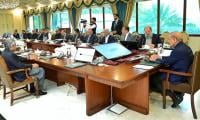WASHINGTON: Pakistan’s Chief of Naval Staff, Admiral Zafar Mahmood Abbasi has said that India's sea based nuclear weaponry initiative has compelled Islamabad to take measures for deterrence in order to keep strategic stability paradigm stabilised.
"Our Eastern neighbor has introduced sea-based nuclear weapons which was a major deviation, and a major nuclear change, between our two countries. So we think once you disturbed this strategic stability paradigm then there is an increased risk of war or conflict," he said adding that, in order to address the threat Pakistan opted for the minimum deterrence required to plug this gap.
Talking to media here at the Pakistan Embassy on Monday afternoon, Admiral Abbasi said since Pakistan was facing security issues, especially threats from its Eastern neighbour, for which it has an elaborate programme in place. The programme provides all the tools, procedures and settings under the Central Command which runs through Strategic Plans Division. "Sea-based nuclear weapons provide assured second strike capability which disturbs the equation, so unless we equate that then the imbalance might induce India to start a conventional war," he added.
Answering a question Admiral Abbasi dismissed the concern that China was setting up a base at the Gwadar Port, and insisted that there was "absolutely no truth to that." He said that there were no plans to hand over any base to foreign navies anywhere in Pakistan, and emphasised that Gwadar was purely a commercial harbour and only Pakistan Navy would have "a big base there." He said so far no foreign warship had entered Gwadar, but whenever that happens it would be open to all other navies including US, French and Royal navy as well.
He further said that Pakistan signed a deal with China in early 2016 to purchase eight conventional submarines. The programme will mature in 2025, half of them will be built in China and the rest in Pakistan.
Referring to recently inked India-US maritime agreements, Admiral Abbasi said such deals were not "a zero sum game," and would not mean that the US was holding exercises with India and not with Pakistan.
"Pakistan is going to hold multi-national maritime exercises in February next year, where some fifty navies from the world including US and Chinese navy will take part," he said. Last such maritime exercise took place in 2017 in which 37 countries participated. However, the naval chief urged that the US should share intelligence gathering with Pakistan to combat drug trafficking through sea routes.
He added that until unless there was a political resolution with India, there might not be any joint Pakistan-India maritime exercises. He said that under Indian Ocean Naval Symposium, the two countries as members work together.
Despite the suspension of the International Military Education and Training (IMET) support from the Trump administration, he said the training wouldn't stop as Pakistan was utilising its own national funds for the programme. He also maintained that the US administration should not have cancelled security assistance to the country but regardless of the fact Pakistan wants a relationship with the US based on equal respect.
The naval chief further said that Pakistan Navy has sufficient resources for the task it has to perform hence it was not seeking to purchase any navy-related aircrafts from the US, however, it’s looking for a replacement programme for P3C Orions - that were damaged in a terrorist attack at the Mehran base. He said that certain planes were outdated, and the new demand was for a long range maritime aircrafts, but that could be from any country.
Responding to another question, he emphasised that there was no such thing as "strategic depth." Pakistan regards Afghanistan as a separate sovereign country and treats it as such. "Pakistan's policy towards Afghanistan remains the same, which is that it wants peace and stability. We don't want large tracts of territory inside Afghanistan, which are ungovernable outside the writ of the government. Pakistan actually faces a lot of threat from Afghanistan already, and thus trying to have fence along the 2300 kilometers border with 500 million dollars."
Admiral Abbasi is in US to attend the International Seapower Symposium, which was established to provide a forum for senior international naval leaders to discuss common maritime challenges and opportunities to enhance international maritime security cooperation.
Before heading to Rhode Island for the purpose, Admiral Abbasi had a stopover in Washington. Speaking with the media along with Ambassador Ali Siddiqui, the Naval Chief said that since Pakistan was located in one of the world's most important geo-strategic location, its navy was taking necessary steps to protect international shipping. "Pakistan has been a part of an international coalition, combined with maritime forces operating under the auspices of naval central command since 2004. During all these years, we have made immense contribution by investigating thousands of vassals, and intercepted thousands of kilograms of drugs, narcotics," he said adding the aim is to work with international partners for maritime security in the region.
President called the Senate meeting under Article 54 of the Constitution
Crowd’s long wait due to persistent rain backed by heavy showers came to an end just for two deliveries with New...
Chief Justice Justice Faez Isa said amendments to the High Court Rules were necessary before appointment of judges
A division bench of the PHC comprising Justice SM Attique Shah and Justice Syed Arshad Ali heard the petition in which...
According to the Senate Secretariat, Gilani emphasized better coordination between the two Houses







